Rebecca Eanes's Blog, page 10
September 9, 2015
The #1 Reasons Parents Yell and How to Turn It Around
Guest post by Andy Smithson, Tru Parenting
It wasn't the traffic you endured while running the kids to football, band and dance practice. It wasn't really the announcement of “I have to pee” that came from the back seat the moment you left the driveway. I wasn't even the constant noise and quarreling between your son and daughter that set you off. It wasn't the pile of paperwork your boss threw at you at the end of your work day, or the mess on the floor when you entered the front door of your house, or the dinner that needed to be prepared and then cleaned up that sent you over the edge. You thought you could handle just one tantrum, one “NO, NO, NO!” But, you started to wonder after the third “No” just how much you could take. It wasn't any one of the one million things you had to do today that sent your voice into the stratosphere. It was all of them combined, plus One More Thing!
We've all heard the idiom “the straw that broke the camel's back.” If you are like most parents, you have probably been that camel at some point or another. Although our children are not generally the “cause” of yelling, they can be awfully adept at performing the behavior that often seems to be “the last straw.” The kids end up getting the tail end of our stress and overwhelm.
But I've never met a parent that likes to yell. So why do parents yell?
What parents said was the #1 reason for yelling at the kids
I recently asked parents across social media groups and channels what they felt were the top reasons parents yelled at their kids. The comments and responses came rolling in. Hundreds of parents weighed in and I was surprised by the top responses, not because I disagreed, but because I thought that kids would get more of the blame. We are either a more insightful and enlightened generation of parents or more self deprecating. Not sure which. Either way, there was no disputing the top results. Parents sighted personal, internal issues far more than external triggers such as their children's specific behaviors.
The #1 reason parents reported that they yell, by a long shot, was stress and overwhelm. Behaviors like “not listening, slow pokes or bedtime struggles” certainly came up, but they did not dominate the discussion as I had anticipated.
We can all relate. I've felt it. You've felt it. The proverbial straw that breaks the camel's back can be anything. Sometimes its a food complaint at the dinner table. Other times it's that shoe that you swore you asked them to pick up a half hour ago. Regardless of what it is that leads us to lose it, we can usually trace it back to the overall load rather than the one specific act.
It happens to all of us, but don't worry, there is help and relief!
When it comes to stress and overwhelm there are basically 3 choices we can make, or better yet, we can implement all 3. We can...
Decrease our stressIncrease our toleranceManage the stress we've got more effectively
Here are 3 suggestions of specific ways we can do a little of each in our daily lives and lead to less stress and overwhelm and subsequently, less yelling.
Say “No” more often. This can be easier said than done. It takes some serious introspection and wisdom to see and acknowledge our own limits and then to respectfully communicate those to others in our lives. But, if we want to have more and greater quality time with the people that are most important to us, we have to learn to say “no” to more “stuff” that we fill our lives with. You don't have to do everything. Say it with me... “It's okay to buy the Oreos rather than baking the gourmet desert for the school function. It's okay to to limit some of the extra-curriculars.” If you find yourself struggling with setting boundaries and saying “no” to things in your life, I often suggest the book “Boundaries” by Dr. Henry Cloud. Practice chilling out every day. You have more power than you think you do over your emotional state and reactions. I teach my counseling and coaching clients a skill I call the Quick Calm Technique and often utilize several meditation practices to help parents learn to increase awareness, tolerance and conscious, mindful responding. Our ability to tolerate and eliminate distress is both a physiological and mental activity. It takes regular practice to get good at it.Change how we look at stress. We can learn to experience stress differently by simply changing how we view it. Kelly McGonigal is a stress researcher that taught people for years that stress was “bad” and to avoid it like the plague. Through continued study she found that this view of stress was actually more harmful than the stress itself. In her TED talk, “How to Make Stress Your Friend” she explains that when we come to recognize our natural stress response as a natural and positive response that helps our body and mind prepare for challenges, we can actually change our biology and physiology surrounding that stress and have much more favorable outcomes. Stress can actually be “good.” Designing some specific positive self talk around our stress can be a simple way to start changing our view and turn overwhelm into greater strength and success.
The implementation of these 3 skills regularly can set the stage for dramatic changes in our own lives and in the lives of our kids and families. You will have less stress as well as get better at stress. You don't have to let the little things add up anymore. When our load is lighter and our ability to carry that load is strengthened our kids no longer have to play the role of the “straw that broke the camel's back.” They get to play the role of the learning, growing silly little boy or girl. They get to play the role of your child.
Sometimes we need help
Remembering all of these skills and techniques and staying accountable to following through with the practice required to master our stress and overwhelm often requires having help. We like to think that we can do everything on our own, but it just ends up stressing us out more. It's not the knowing that is the hard part. It's the doing that is the hard part. This is why Andy has created the “Stop Yelling in 21 Days Coaching Course.” It is a complete and comprehensive course that will fit any schedule and budget. It will give you the tools, inspiration and support you need to relax a little more, decrease your stress and overwhelm and finally stop yelling!
Register for the Stop Yelling Course Here.
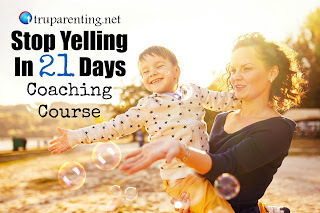
It wasn't the traffic you endured while running the kids to football, band and dance practice. It wasn't really the announcement of “I have to pee” that came from the back seat the moment you left the driveway. I wasn't even the constant noise and quarreling between your son and daughter that set you off. It wasn't the pile of paperwork your boss threw at you at the end of your work day, or the mess on the floor when you entered the front door of your house, or the dinner that needed to be prepared and then cleaned up that sent you over the edge. You thought you could handle just one tantrum, one “NO, NO, NO!” But, you started to wonder after the third “No” just how much you could take. It wasn't any one of the one million things you had to do today that sent your voice into the stratosphere. It was all of them combined, plus One More Thing!
We've all heard the idiom “the straw that broke the camel's back.” If you are like most parents, you have probably been that camel at some point or another. Although our children are not generally the “cause” of yelling, they can be awfully adept at performing the behavior that often seems to be “the last straw.” The kids end up getting the tail end of our stress and overwhelm.
But I've never met a parent that likes to yell. So why do parents yell?
What parents said was the #1 reason for yelling at the kids
I recently asked parents across social media groups and channels what they felt were the top reasons parents yelled at their kids. The comments and responses came rolling in. Hundreds of parents weighed in and I was surprised by the top responses, not because I disagreed, but because I thought that kids would get more of the blame. We are either a more insightful and enlightened generation of parents or more self deprecating. Not sure which. Either way, there was no disputing the top results. Parents sighted personal, internal issues far more than external triggers such as their children's specific behaviors.
The #1 reason parents reported that they yell, by a long shot, was stress and overwhelm. Behaviors like “not listening, slow pokes or bedtime struggles” certainly came up, but they did not dominate the discussion as I had anticipated.
We can all relate. I've felt it. You've felt it. The proverbial straw that breaks the camel's back can be anything. Sometimes its a food complaint at the dinner table. Other times it's that shoe that you swore you asked them to pick up a half hour ago. Regardless of what it is that leads us to lose it, we can usually trace it back to the overall load rather than the one specific act.
It happens to all of us, but don't worry, there is help and relief!
When it comes to stress and overwhelm there are basically 3 choices we can make, or better yet, we can implement all 3. We can...
Decrease our stressIncrease our toleranceManage the stress we've got more effectively
Here are 3 suggestions of specific ways we can do a little of each in our daily lives and lead to less stress and overwhelm and subsequently, less yelling.
Say “No” more often. This can be easier said than done. It takes some serious introspection and wisdom to see and acknowledge our own limits and then to respectfully communicate those to others in our lives. But, if we want to have more and greater quality time with the people that are most important to us, we have to learn to say “no” to more “stuff” that we fill our lives with. You don't have to do everything. Say it with me... “It's okay to buy the Oreos rather than baking the gourmet desert for the school function. It's okay to to limit some of the extra-curriculars.” If you find yourself struggling with setting boundaries and saying “no” to things in your life, I often suggest the book “Boundaries” by Dr. Henry Cloud. Practice chilling out every day. You have more power than you think you do over your emotional state and reactions. I teach my counseling and coaching clients a skill I call the Quick Calm Technique and often utilize several meditation practices to help parents learn to increase awareness, tolerance and conscious, mindful responding. Our ability to tolerate and eliminate distress is both a physiological and mental activity. It takes regular practice to get good at it.Change how we look at stress. We can learn to experience stress differently by simply changing how we view it. Kelly McGonigal is a stress researcher that taught people for years that stress was “bad” and to avoid it like the plague. Through continued study she found that this view of stress was actually more harmful than the stress itself. In her TED talk, “How to Make Stress Your Friend” she explains that when we come to recognize our natural stress response as a natural and positive response that helps our body and mind prepare for challenges, we can actually change our biology and physiology surrounding that stress and have much more favorable outcomes. Stress can actually be “good.” Designing some specific positive self talk around our stress can be a simple way to start changing our view and turn overwhelm into greater strength and success.
The implementation of these 3 skills regularly can set the stage for dramatic changes in our own lives and in the lives of our kids and families. You will have less stress as well as get better at stress. You don't have to let the little things add up anymore. When our load is lighter and our ability to carry that load is strengthened our kids no longer have to play the role of the “straw that broke the camel's back.” They get to play the role of the learning, growing silly little boy or girl. They get to play the role of your child.
Sometimes we need help
Remembering all of these skills and techniques and staying accountable to following through with the practice required to master our stress and overwhelm often requires having help. We like to think that we can do everything on our own, but it just ends up stressing us out more. It's not the knowing that is the hard part. It's the doing that is the hard part. This is why Andy has created the “Stop Yelling in 21 Days Coaching Course.” It is a complete and comprehensive course that will fit any schedule and budget. It will give you the tools, inspiration and support you need to relax a little more, decrease your stress and overwhelm and finally stop yelling!
Register for the Stop Yelling Course Here.

Published on September 09, 2015 20:17
September 4, 2015
Helping Our Kids Cope with Stress
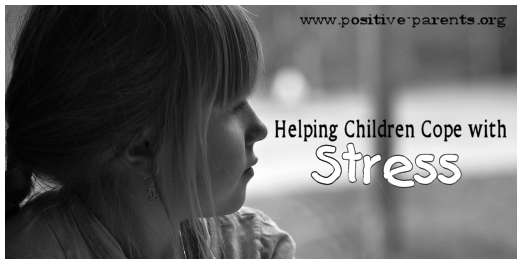
I recently had the pleasure of reading Susan Stiffelman's book, Parenting with Presence. One of the chapters that struck me most was called "Helping Our Kids Cope with Stress." In this chapter, Susan outlines some the alarming recent studies about our adolescents:
Research conducted by the University of Michigan stated that 10% of high school sophomores and almost one in eight seniors admitted to using illegally obtained medications (study drugs) to keep up with their workload....
Thirty percent of teens reported feeling overwhelmed, depressed, or sad as a result of stress...
In the past 60 years, the suicide rate has quadrupled for males 15-24 years old and doubled for females of the same age. Suicide rates for those between the ages of 10 and 14 increased by more than 50% between 1981 and 2006...
The AAP released a study noting that stress hormones can have a significant long-term impact on a teen's body. Stress can unleash chemicals that interfere with the development of neuronal networks in the developing brain as well as inhibit the development of new neurons in growing brains..
In her book, Susan offers practical solutions for helping our children cope with stress. I will outline those here.
1. Connecting in Real Life. A strange thing is happening in this day and age. Somehow we are more connected than ever through social media and constant availability via cell phones, yet we are more lonely. The connection is superficial. These cyber connections don't allow us to truly be seen or heard, and as we are more and more plugged in, we get increasingly more distant in our unplugged lives. Feeling isolated or disconnected is a significant contributor to stress. Susan says, "Being connected in a shallow way to the entire world can prevent us from being deeply connected to those closest to us -- including ourselves."
A genuine, close connection with a loved one is one of the most effective antidotes to stress. "Children who have durable, reliable attachments with healthy loved ones are much better able to cope with life's stressors," Susan says.
How do we connect? I wrote 10 ways to connect to your child here. (These are my tips, not Susan's.)
2. Managing Change and Uncertainty. Life will always throw unexpected wrenches in our plans, and learning to be flexible and handle these unexpected situations is a key buffer against stress. Susan suggests 2 ways we can help our children handle uncertainty. One is through modeling, of course. Children are watching how we handle stressful situations, from waiting in a line that is taking forever and possibly making you late to your next appointment to delayed flights, your reactions often become their reactions. Therefore, learning to manage stress yourself is vital to teaching your children how to manage it. Second, Susan suggests "making friends with the worst-case scenario." For example, discuss what might happen if you are late to your next appointment or your flight does get delayed. Yes, it will be inconvenient, but you will be okay. Children need to know that.
3. Having fun. Susan tells us, "Helping our children isn't just about teaching them how to cope when things aren't going well. It is also about infusing their days with enjoyment." We know that laughter is an antidote to stress. Find ways to have fun with your children. Turn up the music and dance. Watch comedies together. Enjoy life with each other!
4. Persisting. Susan highlights the importance of developing inner resources to push through stumbling blocks and to keep trying when success eludes us. Teaching children that happiness and peace can be achieved even if we don't reach all of our goals or if things don't go the way we'd planned is key in helping them cope with stress. Once again, what we model as parents is largely what teaches these lessons. She advises letting them hear you ask, "Will this be an issue in five years - to two days?"
Here is an article on teaching young kids persistence.
5. Paying attention to your child's stress. Watch for signs of anxiety and depression. Make sure children know they can trust you with whatever they are doing through by maintaining open lines of communication and a trusting relationship.
According to the Anxiety and Depression Association of America, children with depression may display these symptoms:
Depressed or irritable moodDifficulty sleeping or concentratingChange in grades, getting into trouble at school, or refusing to go to schoolChange in eating habitsFeeling angry or irritableMood swingsFeeling worthless or restlessFrequent sadness or cryingWithdrawing from friends and activitiesLoss of energyLow self-esteemThoughts of death or suicideWhen symptoms last for a short period of time, it may be a passing case of “the blues.” But if they last for more than two weeks and interfere with regular daily activities and family and school life, your child may have a depressive disorder.
6. Practicing mindfulness. Susan recommends practicing mindfulness each day, ideally in the same place and around the same time, as a small family ritual. She offers several practices in the book, so I will just highlight one of them that I like best called "follow the breath." Sit comfortably with your child and ask them to pay attention to the breath coming in, noticing the air coming in through their nostrils. Is it warm or cool air? Ask them to follow it as it makes it's way into the lungs, and feel how the chest rises and falls. Instruct them to refocus on the breath if their mind starts to wander, and to be quiet for a few breaths. Doing this short exercise for a few minutes each day is one way to help your child learn to cope with stress.
There are many nuggets of wisdom to be found in Parenting with Presence. It's a great addition to your positive parenting library. One of the things I love about this book is the "Making It Practical" section at the end of each chapter. Susan doesn't just give lofty ideas about being an attuned and present parent, but she offers practical advice on how to implement each idea she covers, and that is really helpful both for someone new to this philosophy and for seasoned parents as well.
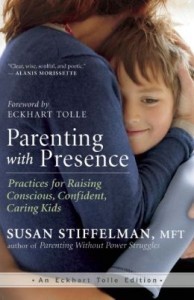
Published on September 04, 2015 09:51
Does Positive Parenting Reward Misbehavior?
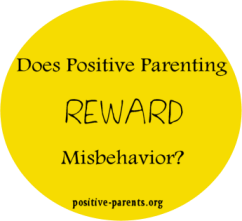
This is post #3 in my “Debunking Myths about Positive Parenting” series. In post one, I debunked the myth that positive parents just want to be friends , and in post two, I set the record straight on the false assumption that we do not discipline our children . Because Positive Parenting is centered around connection, I often advocate for practices such as time-in rather than time-out when misbehavior arises and being emotionally supportive through tantrums as opposed to ignoring them.
These ideas often draw the reaction of “but isn’t that rewarding tantrums and misbehavior?!” The short answer is “no.”
The long answer is “the whole foundation of positive parenting is not based upon rewarding or punishing behavior but rather upon understanding what is driving a child’s behavior and giving the child the knowledge and skills needed to not only govern his own behavior but to grow into his own full potential as an emotionally healthy and secure adult.”
I usually give the short answer. You can see why.
However, the long answer is much more accurate, and I’d like to try to explain further so as to debunk this myth for good.
When we look at behavior in terms of something we need to reward (with the intention of getting the child to perform well again) or punish (intending to deter the behavior), then we are essentially trying to control the child. This may seem to work for a while when children are young, but control over another person is just an illusion. You can’t really control how they will act when you’re not around, and that is one of the reasons why I’ve decided to drop the act and instead teach my children how and why to control themselves. After all, that’s the end game of discipline, isn’t it? Self-discipline?
If they’re going to really absorb my words and heed my advice on how to govern themselves, then they need to be in a healthy, connected, secure relationship with me. That’s why I chose time-in over time-out, because I needed to first connect with my hurting child before I could show him a better way. I use the past tense here because my children are now too old for time-in and we’ve moved on to problem-solving . However, what I came to understand some years ago was that my connection to my children was not a reward but a lifeline. It wasn’t something I could dangle like a carrot in front of their noses, offering a sense of security, trust, and unwavering love only when they behaved well and yanking it away when their behavior was off-track. I discovered that their connection to me was, at least in part, what inspired them to do better.
Why be concerned with what is driving the child’s behavior? Does it really matter? Isn’t the goal just to make them stop the misbehavior?...continue reading at Creative Child

For more of my Positive Parenting articles featured in Creative Child Magazine, click here.
Published on September 04, 2015 07:53
August 31, 2015
4 Parental Behaviors to Avoid
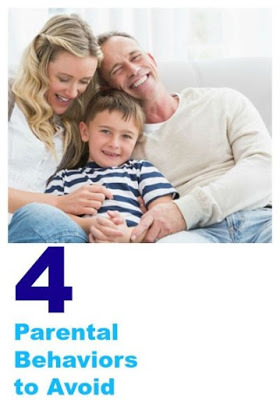
Dr. John Gottman is a world-renowned relationship expert. Through many years of research, he has discovered 4 behaviors that we should avoid if we want to have strong, healthy relationships. He calls these behaviors the four horsemen of the apocalypse because they are sure to bring about the end of a relationship. Having a healthy, connected relationship with our children is what enables us to influence and guide them throughout childhood; therefore, having knowledge and understanding of these 4 pitfalls and their antidotes can help you build a better relationship with those most precious to you – your children.
Horseman #1: Criticism
Parents often use criticism in an attempt to motivate a child to do better, but criticism rarely motivates. It tears down. Criticism is pointing out something negative – basically shining a spotlight on the child’s flaws and negative traits. The problem is that, according to Dr. Julie Gottman, “kids take in all that criticism as a way of reflecting who they are.” It makes children believe that there is something wrong with them. I’ve said before that parents should be the people who see the best in our children and shine the spotlight on their good qualities. Children can’t see and live up to the best in themselves if we’re always pointing out the worst.
Examples of Criticism:
“You’re so clumsy.” “Why can’t you ever remember to make your bed? What is wrong with you?” “Look at this mess! You’re too lazy to clean your room.” “You’re spoiled rotten and don’t appreciate anything!”
What are kids really hearing in these phrases? Be more careful to not spill your drink? Please be responsible and make your bed? I’d like for you to tidy your room? I wish you were more appreciative? No. They’re hearing: You’re clumsy. You’re stupid. You’re lazy. You’re spoiled. Any motivation to do better is squashed under the weight of shame.
The Fix:
Leave out character judgments and use “I statements” to state what you want. “Oops, it spilled. I want you to get a cloth and wipe it up.” “I want you to make your bed, please.” “I want you to clean your room before you go to your friend’s house.”
Horseman #2: Contempt
Contempt is criticism coming from a place of superiority. It comes out as name-calling, sneering, eye-rolling, sarcasm, hostile humor, and mockery. Interestingly, contempt not only predicted how relationships would go but it predicted how many infectious illnesses the listener would have in the coming year! I can only conclude from that information that talking down to a child tears down more than his self-esteem.
Examples of Contempt:
“Stupid brat!” “Are you ignorant? Why would you do that?” “You wouldn’t even think of picking up your clothes, would you?” “Aw, look at the little baby crying again! Wah wah!”
The Fix:
The antidote for contempt is respect. Treat your child with the same respect you want her to treat you with.
Horseman #3: Defensiveness
Defensiveness is described as a reaction against feeling personally attacked; self-protection through righteous indignation or playing the victim. In the parent-child relationship, the parent may feel defensive when he realizes he was actually in the wrong or when a child points out the parent’s flaws (criticizes the parent). Basically, defensiveness says “the problem is not me, it’s you.” It’s avoiding taking responsibility by placing blame on the child.
Examples of Defensiveness:
“I wouldn’t have yelled if you’d have done what you were told!” “I shouldn’t have called you stupid, BUT you made me so angry.”
The Fix:
Accept responsibility for your part in the problem, and listen to how your child is feeling with an attempt to truly understand her position. “I shouldn’t have called you stupid. I’m sorry.” “I apologize for yelling. I lost my temper.” ...continue reading at CreativeChild

For more of my Positive Parenting articles featured in Creative Child Magazine, click here.
Published on August 31, 2015 21:04
August 21, 2015
Becoming an Emotion Coach
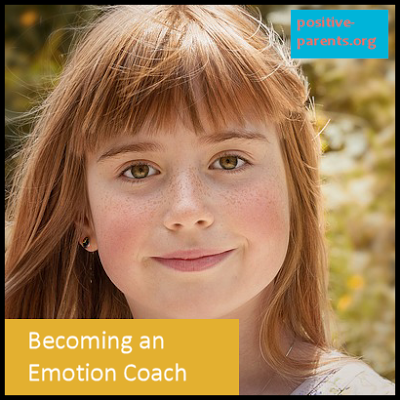
I'm over at The Gottman Institute today with a post on becoming emotional coaches for our children. Did you now that being able to understand and manage emotions well is one of the key predictors for a successful life? Read on to learn how to give your child a head start!
**********
What determines how children turn out? This is the question on every parent's mind. What can we do to give our children the best start in life and to ensure that they grow into kind, intelligent, and happy people? As parents, we all want to raise kids who:
Are compassionateTreat others wellAre confidentThink for themselvesHave good valuesAre proud but not arrogantValue themselves and their abilitiesHave morals we respect and admireInterestingly, world-renowned relationship researchers Drs. John and Julie Gottman have determined two predictors for how children turn out.
1. Emotion regulation: The ability to understand and manage feelings
2. Social relationships: How children get along with adults and other children
Unfortunately, very few parenting resources discuss these two predictors. Most parenting resources focus only on discipline, and that alone does not help parents reach these goals. Realizing that parenting is about so much more than a discipline method - that a big part of good parenting is teaching children emotion regulation - I turned to the Gottmans’ Emotion Coaching: The Heart of Parenting video program.
Dr. John Gottman says that parents cannot accomplish all of these goals with discipline alone, and that this is instead accomplished through what Dr. Julie Gottman calls “Magic Moments.” These are moments of connecting with children when they are emotional. It is through connecting during Magic Moments that parents can really influence how children feel about themselves and about the world. How we connect during those moments is dependent upon our own “meta-emotions,” which is how we feel about feelings, and of course, how we feel about feelings is a direct result of how we were treated in childhood when we showed emotions!
In general, the Gottmans discovered that there are 2 types of parents when it comes to meta-emotions.
1. Dismissing/disapproving parents who see sadness and anger as though they are harmful poisons. These parents will do anything to change the child’s emotion to a positive one, feeling that anything other than a happy child is an indication that they are a failure as a parent. They says these parents view emotions as if they were a piece of clothing that you can choose to put on or take off.
2. Emotion coaches are parents who view emotions as an opportunity to connect and teach. These parents, Dr. John Gottman says, notice lower intensity emotion in their children as well as in themselves. They meet all emotion first with understanding and empathy, and then these parents set limits or problem-solve, depending upon whether misbehavior was connected to the emotion.
In the Emotion Coaching program, the Gottmans outline the benefits of having at least one emotion coaching parent. These children:
Have higher achievementHave fewer infectious illnessHave better impulse control and delayed gratificationRequire less disciplineWhine lessAre buffered from most negative effects of divorceHow to be an Emotion Coach:
1. Help children verbally label their emotions. To be able to regulate emotions, children must understand them – what they feel like, what brings them on, and what to do when they feel them.
2. ...continue reading how to become an emotion coach at The Gottman Institute Blog
Posted by Positive Parenting: Toddlers and Beyond on Friday, August 21, 2015
Published on August 21, 2015 12:45
August 19, 2015
The Positive Discipline Difference
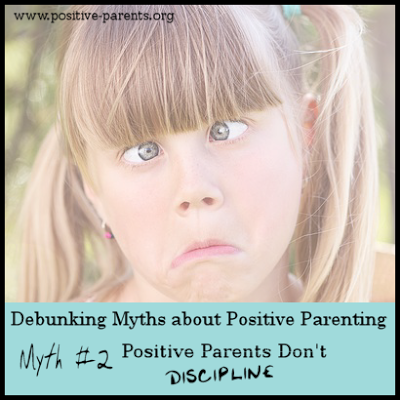
Last week, I debunked the myth that positive parents just want to be friends with their children. You can read that post here. This week, I want to address the idea that we simply don’t discipline our children. “But kids need discipline” is a recurrent comment on my Facebook page, and I must say that I absolutely agree. Kids DO need discipline! So do teachers, firefighters, artists, store managers, farmers, - every responsible, productive human being. So, the question is, what is discipline and how do we make sure our kids have it?
If you look up the definition for discipline today, you’re going to get something along the lines of “to punish or rebuke for an offense,” which I think is an unfortunate twist of the original Latin meaning, “instruction or knowledge.” I almost never punish my kids, but I do offer a lot of instruction and knowledge (which I wouldn’t do if I were permissive). Therefore, I definitely discipline my children, just not in the same way as many, and there’s a reason for that. The conventional way of discipline, to punish for an offense, is problematic for several reasons:
Quick-fix: By doling out an immediate punishment, we’ve skipped right over an attempt at understanding the cause of the behavior and what the child may need taught or helped with in favor of a quick-fix solution to make the behavior stop. Unfortunately, when we miss the cause or need behind the behavior, we’ve missed a key opportunity to help the child learn to understand and control himself, and ultimately I think that’s the real goal here – a child who is self-disciplined (who doesn’t need a parent following her around enforcing rules). We want them to know how to do what’s right when we aren’t there with our threats and parental power, yet we undermine our own efforts when we skip the teaching what’s right part in favor of the quick fix.
Missed connection:It’s clear that punishing children causes a disconnection between us and them, but most parents feel that the disconnection is necessary in order to teach the child a lesson. Ironically, connection is the very thing that makes children follow our rules, heed our instruction, and want to do well. In addition, the benefits of connection (attachment) is well-documented, and leads to higher self-confidence, resilience, social skills, and emotional health. When we approach a behavioral issue with the intent to understand and teach rather than to make the child pay, we can discipline while maintaining our crucial connection.
Wrong focus:Punishment often makes children focus more on their own suffering than on the effects of their behavior. In her book Easy to Love, Difficult to Discipline, Dr. Becky Bailey says this, “You cannot simultaneously feel bad about what you have done and focus on what you must do differently.” In this way, punishment actually shuts down learning, and the lesson we are trying to teach is lost on a resentful child. Sadly, for some children, punishment makes them feel so badly that they begin to believe they are bad people, and when that gets into a child’s self-concept, he will behave the way he sees himself. Psychologists refer to this as a self-fulfilling prophecy.
Those are the reasons I have chosen to discipline differently, with the intent to instruct and impart knowledge rather than to punish. To be clear, I have had to allow consequences that teach because, as we all know, poor behavior has negative consequences, but these are natural consequences that I don’t have to impose or a result of a solution that my child and I have arrived at together. If you’re wondering what I do instead of punishment, take at a look at these 3 alternatives to the old time-out I used to use.
Positive parents discipline in an unconventional way, but the idea that we don’t discipline at all is FALSE. In fact, I spend a good amount of time each day disciplining my children. It can be confusing to understand how to discipline without relying on punishment. It took a while for me to fully understand it, too. Once I did understand the reasons for connection, finding the need behind the behavior, teaching appropriate alternatives, and looking for solutions to problems, it became much easier to discipline my children positively, and I really feel that the benefits have been great for us all.
The links provided in the article will provide some insight into alternative methods of discipline. For more, pick up The Newbie’s Guide to Positive Parentingand Positive Parenting in Action.
AS SEEN AT CREATIVE CHILD MAGAZINE

For more of my Positive Parenting articles, click here.
Published on August 19, 2015 12:07
August 17, 2015
Are We Just Friends?
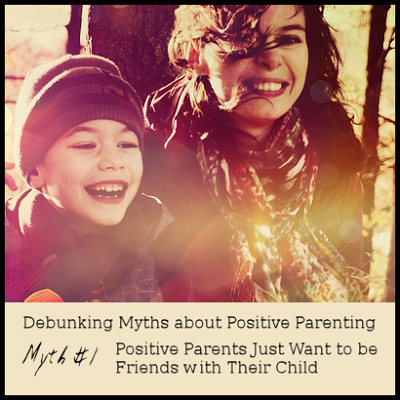
During my years as administrator of a popular Positive Parenting page on Facebook, I’ve seen quite a few myths swirling about the public regarding positive parents. In this new series, Debunking Myths about Positive Parenting, I’ll be addressing such myths as:
Positive parents just want to be friends with their childrenPositive parents don’t disciplinePositive parents reward tantrums and misbehaviorPositive parents are helicopter parentsPositive parents are permissive parentsAs a positive parent for 9 years now, I want to discuss this idea that I just want to be my children’s friend. While it is true that friendship is an aspect of the positive parent/child relationship (and an important one), the idea that I only want to be buddies is completely FALSE.
Let me be clear about what kind of friend I am NOT:
1. I’m not the kind of friend who lets them make poor choices while I sit idly by or even, gasp, join in.
It seems that the thought of a parent being a child’s friend conjures up images of a parent who gives no rules, no boundaries, and no discipline. These “friends” turn away when their children misbehave because correcting the child would cause ill feelings which might jeopardize the friendship.
At worst, these “friends” may even join their children for a night of partying and poor decisions to strengthen the friendship bond. How is this the definition of a friend? I hope my friends would care enough about me to step in if they saw me heading down a destructive path, and boundaries are a part of all healthy relationships.
2. I’m not the kind of friend who inappropriately confides in my children or dumps all of my emotional baggage on them.
Another “friend” concern that I’ve heard about is that of over-sharing our adult problems. While I believe in being authentic with my children, I don’t think it would be mature of me to dump my issues, worries, problems, and fears on their heads, and I think all positive parents would agree. I know how to save that for my grown-up friends and not burden my children with things they shouldn’t have to carry.
3. I’m not the kind of friend who bubble-wraps them and protects them from all failure and struggle.
I’ll discuss this more in a future post about helicoptering, but again, this is really not my idea of friendship. I want friends who encourage me to reach for the stars and listen compassionately when I fall. It can certainly be uncomfortable to see children fail at something that was important to them. My gut says to protect them, but I know that failure is a part of life. I don’t always protect them from the fall; I just provide a soft landing.
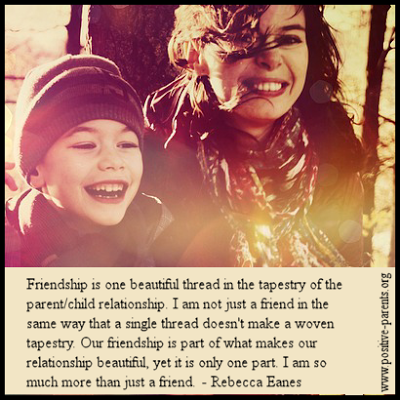
Let me be clear about what kind of friend I AM:
1. I am the kind of friend who listens.
When they tell me about their Lego creation (again), I make a point to be engaged and actively listening. I listen when they tell me stories or when they share fears. I listen to dreams and Batman story lines...continue reading at CreativeChild

Read more of my positive parenting articles here.
Published on August 17, 2015 20:35
Debunking Myths About Positive Parenting - Myth #1 Just Friends?

During my years as administrator of a popular Positive Parenting page on Facebook, I’ve seen quite a few myths swirling about the public regarding positive parents. In this new series, Debunking Myths about Positive Parenting, I’ll be addressing such myths as:
Positive parents just want to be friends with their childrenPositive parents don’t disciplinePositive parents reward tantrums and misbehaviorPositive parents are helicopter parentsPositive parents are permissive parentsAs a positive parent for 9 years now, I want to discuss this idea that I just want to be my children’s friend. While it is true that friendship is an aspect of the positive parent/child relationship (and an important one), the idea that I only want to be buddies is completely FALSE.
Let me be clear about what kind of friend I am NOT:
1. I’m not the kind of friend who lets them make poor choices while I sit idly by or even, gasp, join in.
It seems that the thought of a parent being a child’s friend conjures up images of a parent who gives no rules, no boundaries, and no discipline. These “friends” turn away when their children misbehave because correcting the child would cause ill feelings which might jeopardize the friendship.
At worst, these “friends” may even join their children for a night of partying and poor decisions to strengthen the friendship bond. How is this the definition of a friend? I hope my friends would care enough about me to step in if they saw me heading down a destructive path, and boundaries are a part of all healthy relationships.
2. I’m not the kind of friend who inappropriately confides in my children or dumps all of my emotional baggage on them.
Another “friend” concern that I’ve heard about is that of over-sharing our adult problems. While I believe in being authentic with my children, I don’t think it would be mature of me to dump my issues, worries, problems, and fears on their heads, and I think all positive parents would agree. I know how to save that for my grown-up friends and not burden my children with things they shouldn’t have to carry.
3. I’m not the kind of friend who bubble-wraps them and protects them from all failure and struggle.
I’ll discuss this more in a future post about helicoptering, but again, this is really not my idea of friendship. I want friends who encourage me to reach for the stars and listen compassionately when I fall. It can certainly be uncomfortable to see children fail at something that was important to them. My gut says to protect them, but I know that failure is a part of life. I don’t always protect them from the fall; I just provide a soft landing.

Let me be clear about what kind of friend I AM:
1. I am the kind of friend who listens.
When they tell me about their Lego creation (again), I make a point to be engaged and actively listening. I listen when they tell me stories or when they share fears. I listen to dreams and Batman story lines...continue reading at CreativeChild

Read more of my positive parenting articles here.
Published on August 17, 2015 20:35
August 7, 2015
Positive Communication with Children
Positive communication is an essential part of all healthy relationships. It builds mutual respect, trust, connection, and nurtures your child’s self-esteem. The parent/child relationship is our first place for learning how relationships should be. Therefore, when we set the standard for healthy, positive communication now, children develop skills that will help them build healthy relationships lifelong.
Here are the guidelines for positive, respectful communication with children.
DO: ACTIVELY LISTEN TO YOUR CHILD:
Oftentimes, parents listen to respond rather than to understand. We want to quickly offer our judgments and advice, but doing so may shut down the lines of communication. Active listening means you listen attentively without interrupting, seeking to understand the words, the emotion, and the message of the speaker.
Put away distractions (don’t look at your phone or a newspaper, but give full attention to your child), show you’re interested by using positive body language (nods, eye contact, open posture), offer encouragement to continue talking, such as “go on” or “uh-huh,” and make sure you understood what was being said by paraphrasing.
For example, “What I’m hearing is that you...Is that correct?”
SPEAK RESPECTFULLY:
“I said NOW!” “What were you thinking?!” “Get in there and pick that mess up THIS INSTANT!”
Who else would we ever speak to this way except a child? No one! Speaking to children this way isn’t necessary, either. Tone is as important as words, so use a positive, even tone and don’t speak to them in a way you wouldn’t use on anyone else.
I know it can be exasperating when children don’t listen or when they behave in ways we don’t like, but speaking disrespectfully will never encourage cooperation or better behavior. It only sets a poor example for communication – one they will likely pick up and use on you or others in the future.
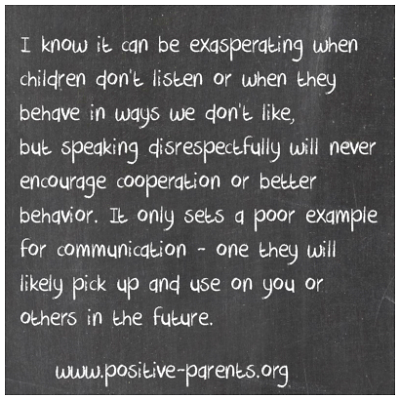
GET ON EYE LEVEL:
If you are towering over a child, it can feel intimidating for them. When a child has something to tell you, get down on eye level if you can. This helps children feel more at ease, which opens up communication. Being on eye level conveys the message that you are really paying attention and enhances connection.
EMPATHIZE:
Try to see things from your child’s perspective. When we dismiss or reject our children’s feelings, opinions, and ideas with “it’s not that bad,” “there’s no need to be upset,” “that’s a silly idea,” or “that’ll never work,” they feel invalidated. That shuts down communication. Empathy not only helps us communicate our thoughts to others in a way that makes sense to them, but it allows our children to feel heard and understood.
MANAGE YOUR EMOTIONS:
Being in tune with and in charge of your emotions and being able to regulate before you respond is key to positive communication. When you are able to remain calm and positive and refrain from attacks and saying something you might regret later, you model true maturity to your child. Plus, with no threat of an outburst from you, your child will feel comfortable opening up to you about bigger and tougher things.
BE ASSERTIVE:
Clear, direct, assertive communication means you express your feelings, needs, and desires effectively, while respecting the rights of others. Being assertive is a necessary parenting skill. Aggressiveness puts children on the defensive, and passiveness gives children a disproportionate amount of control.
When you communicate assertively, use “I” statements, discuss your feelings, and give reasoning for your boundaries or rules. While being assertive, always keep your child’s feelings, needs, and wants in mind. This builds mutual respect. Teach your child how to communicate assertively as well as it's an important skill to have.
DONT: USE CONDITIONAL COMMUNICATION:
Giving a child the cold shoulder, not speaking to him, rolling your eyes, scowling, and withholding affection when a child displeases you is not modeling good communication skills. While we must correct poor behavior, be careful not to communicate conditional love as that damages a child’s self-esteem and breaks down the connection.
LECTURE WHEN ANGRY:
It’s unlikely that you’ll communicate effectively when your reptilian brain is lit up. Wait until you are calm and rational before confronting your child. Try saying, “We need to talk about this soon. First, I need to calm down.”
CRITICIZE:
Honestly, I’m not sure if there is such a thing as constructive criticism. Criticism is always painful as it is a direct attack. Rather than criticize, describe what needs to be done. Instead of “your room is always a mess,” say “I need you to clean your room by this afternoon.” When you focus on what you want done in the future, rather than on what your child did wrong in the past, you’re much more likely to have a positive outcome.
Use these guidelines for effective, positive communication. When you model these strategies, your children will also begin to use them in not just communication with you, but with others in the future.
As seen on CreativeChild

Here are the guidelines for positive, respectful communication with children.
DO: ACTIVELY LISTEN TO YOUR CHILD:
Oftentimes, parents listen to respond rather than to understand. We want to quickly offer our judgments and advice, but doing so may shut down the lines of communication. Active listening means you listen attentively without interrupting, seeking to understand the words, the emotion, and the message of the speaker.
Put away distractions (don’t look at your phone or a newspaper, but give full attention to your child), show you’re interested by using positive body language (nods, eye contact, open posture), offer encouragement to continue talking, such as “go on” or “uh-huh,” and make sure you understood what was being said by paraphrasing.
For example, “What I’m hearing is that you...Is that correct?”
SPEAK RESPECTFULLY:
“I said NOW!” “What were you thinking?!” “Get in there and pick that mess up THIS INSTANT!”
Who else would we ever speak to this way except a child? No one! Speaking to children this way isn’t necessary, either. Tone is as important as words, so use a positive, even tone and don’t speak to them in a way you wouldn’t use on anyone else.
I know it can be exasperating when children don’t listen or when they behave in ways we don’t like, but speaking disrespectfully will never encourage cooperation or better behavior. It only sets a poor example for communication – one they will likely pick up and use on you or others in the future.

GET ON EYE LEVEL:
If you are towering over a child, it can feel intimidating for them. When a child has something to tell you, get down on eye level if you can. This helps children feel more at ease, which opens up communication. Being on eye level conveys the message that you are really paying attention and enhances connection.
EMPATHIZE:
Try to see things from your child’s perspective. When we dismiss or reject our children’s feelings, opinions, and ideas with “it’s not that bad,” “there’s no need to be upset,” “that’s a silly idea,” or “that’ll never work,” they feel invalidated. That shuts down communication. Empathy not only helps us communicate our thoughts to others in a way that makes sense to them, but it allows our children to feel heard and understood.
MANAGE YOUR EMOTIONS:
Being in tune with and in charge of your emotions and being able to regulate before you respond is key to positive communication. When you are able to remain calm and positive and refrain from attacks and saying something you might regret later, you model true maturity to your child. Plus, with no threat of an outburst from you, your child will feel comfortable opening up to you about bigger and tougher things.
BE ASSERTIVE:
Clear, direct, assertive communication means you express your feelings, needs, and desires effectively, while respecting the rights of others. Being assertive is a necessary parenting skill. Aggressiveness puts children on the defensive, and passiveness gives children a disproportionate amount of control.
When you communicate assertively, use “I” statements, discuss your feelings, and give reasoning for your boundaries or rules. While being assertive, always keep your child’s feelings, needs, and wants in mind. This builds mutual respect. Teach your child how to communicate assertively as well as it's an important skill to have.
DONT: USE CONDITIONAL COMMUNICATION:
Giving a child the cold shoulder, not speaking to him, rolling your eyes, scowling, and withholding affection when a child displeases you is not modeling good communication skills. While we must correct poor behavior, be careful not to communicate conditional love as that damages a child’s self-esteem and breaks down the connection.
LECTURE WHEN ANGRY:
It’s unlikely that you’ll communicate effectively when your reptilian brain is lit up. Wait until you are calm and rational before confronting your child. Try saying, “We need to talk about this soon. First, I need to calm down.”
CRITICIZE:
Honestly, I’m not sure if there is such a thing as constructive criticism. Criticism is always painful as it is a direct attack. Rather than criticize, describe what needs to be done. Instead of “your room is always a mess,” say “I need you to clean your room by this afternoon.” When you focus on what you want done in the future, rather than on what your child did wrong in the past, you’re much more likely to have a positive outcome.
Use these guidelines for effective, positive communication. When you model these strategies, your children will also begin to use them in not just communication with you, but with others in the future.
As seen on CreativeChild

Published on August 07, 2015 08:35
July 27, 2015
The Newbie's Guide to Positive Parenting
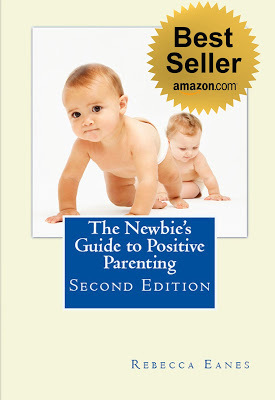
I'm giving away 5 PDF copies of my bestselling book, The Newbie's Guide to Positive Parenting Second Edition!
Connection is the key to joyful parenting and raising emotionally healthy, responsible kids. Make a positive transformation in your home as you let go of fear-based techniques and embrace the philosophy of positive parenting. Filled with practical examples, personal stories, and nuggets of hard-earned wisdom, The Newbie's Guide to Positive Parenting has everything you need to change your parenting paradigm and enrich your family life. If you are desperately missing the close bond you once had with your child, if your days are filled with tears and frustration, this book is for you. The relationships we build with our children last a lifetime. Ultimately, love is the only leverage we have with our kids. Fear-based parenting only works as long as it can be physically or emotionally enforced, but love is a more effective motivator over time. Through being kind and firm, consistent and empathetic, we allow our children optimal development. When the child-rearing is done, the loving bond you have built is what will make your relationship with your adult child fruitful and enjoyable. Positive parenting keeps that relationship intact while teaching and guiding your child to his or her fullest potential.
Read the first chapter for free.
Enter the rafflecopter giveaway below. Good luck!! a Rafflecopter giveaway
Published on July 27, 2015 09:37



